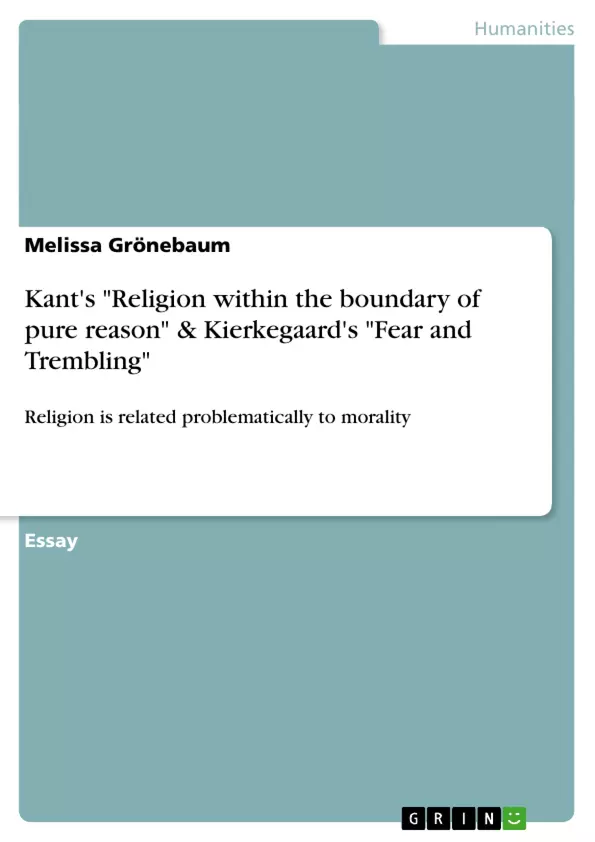“Religion is related problematically to morality” - a thesis which seems incredible at first view. How could the relation of morality and religion be problematic? Does the one not determine the other? Well, strictly speaking, already this question leads to the first possible point of discussion: for, which determines which? Does Religion lead to morality or does morality lead to religion? And does being religious not correlate with the meaning of to act in a good and moral way? To elaborate those questions and prove that and how religion and morality are related problematically, in this essay I will refer to Immanuel Kant and Søren Kierkegaard. Both are considered as being two religious men who start their thinking from the existing religious consciousness within the ethical and are therefore the rights philosophers to concentrate on while analysing the relationship of religion and morality.
Inhaltsverzeichnis (Table of Contents)
- Religion and Morality: A Problematic Relationship
- Kierkegaard: The Case of Abraham
- Kant: Human Nature and the Moral Law
- Religion and the Ethical Suspension of the Moral Law
- Kant: Morality and the Moral Law
- The Moral Law as the Basis of Religion
- The Role of Duty and the Categorical Imperative
- The Importance of Free Will in Moral Action
- Religion as a Means to Overcome Evil
- Kierkegaard: Religious Commitment and Moral Life
- The Necessity of Religious Commitment for Moral Good
- The Importance of Individual Responsibility
- The Role of Fear and Trembling in Moral Life
- The Danger of Religious Delusion
Zielsetzung und Themenschwerpunkte (Objectives and Key Themes)
This essay explores the complex and often problematic relationship between religion and morality, examining how these two forces interact and sometimes conflict. It draws on the ideas of Immanuel Kant and Søren Kierkegaard, two key figures in the history of philosophy who grappled with these issues. The essay examines the following key themes:- The ethical implications of religious beliefs and actions, particularly in cases where religious directives may conflict with moral principles.
- The nature of human evil and the role of religion in overcoming it.
- The concept of free will and its relationship to both morality and religious faith.
- The potential dangers of religious fanaticism and the need for a balanced approach to religion and morality.
- The role of community and social norms in shaping individual moral beliefs and behavior.
Zusammenfassung der Kapitel (Chapter Summaries)
- The essay begins by introducing the concept of a "problematic relationship" between religion and morality. It then explores the story of Abraham from Kierkegaard's "Fear and Trembling," where Abraham is commanded by God to sacrifice his son Isaac. This act raises questions about the nature of religious faith and the ethical limits of obedience to divine commands.
- The essay then moves on to Kant's philosophy of morality, discussing his view of human nature as inherently evil. Kant argues that the only way to overcome this evil is through free adoption of the moral law, guided by the categorical imperative. However, he acknowledges that this process is not always easy and that religion can play a role in motivating and supporting individuals to act morally.
- The essay then examines Kierkegaard's concept of religious commitment and its relationship to moral life. Kierkegaard argues that true religious faith demands a radical commitment that may sometimes go beyond conventional ethical considerations. However, he warns against the dangers of religious fanaticism and insists on the importance of individual responsibility in moral action.
Schlüsselwörter (Keywords)
The essay focuses on the relationship between religion and morality, exploring key concepts such as faith, morality, ethics, human nature, free will, the categorical imperative, religious commitment, and the dangers of religious delusion. It examines the philosophical ideas of Immanuel Kant and Søren Kierkegaard, two influential thinkers who grappled with these issues.Frequently Asked Questions
How are religion and morality "problematically" related?
The essay explores whether religion leads to morality or vice versa, and what happens when religious commands conflict with ethical laws.
What is Kant's view on human nature and the moral law?
Kant views human nature as inherently prone to evil, and argues that moral law must be adopted through free will and the categorical imperative.
What does Kierkegaard's "Abraham" represent?
Abraham represents the "teleological suspension of the ethical," where religious faith demands an action (sacrificing Isaac) that contradicts universal morality.
What role does religion play in overcoming evil for Kant?
For Kant, religion serves as a means to motivate and support individuals in their duty to act according to the moral law.
What danger does Kierkegaard warn about in religious commitment?
He warns against religious delusion or fanaticism, emphasizing individual responsibility even within deep faith.
- Quote paper
- Melissa Grönebaum (Author), 2013, Kant's "Religion within the boundary of pure reason" & Kierkegaard's "Fear and Trembling", Munich, GRIN Verlag, https://www.grin.com/document/268384



